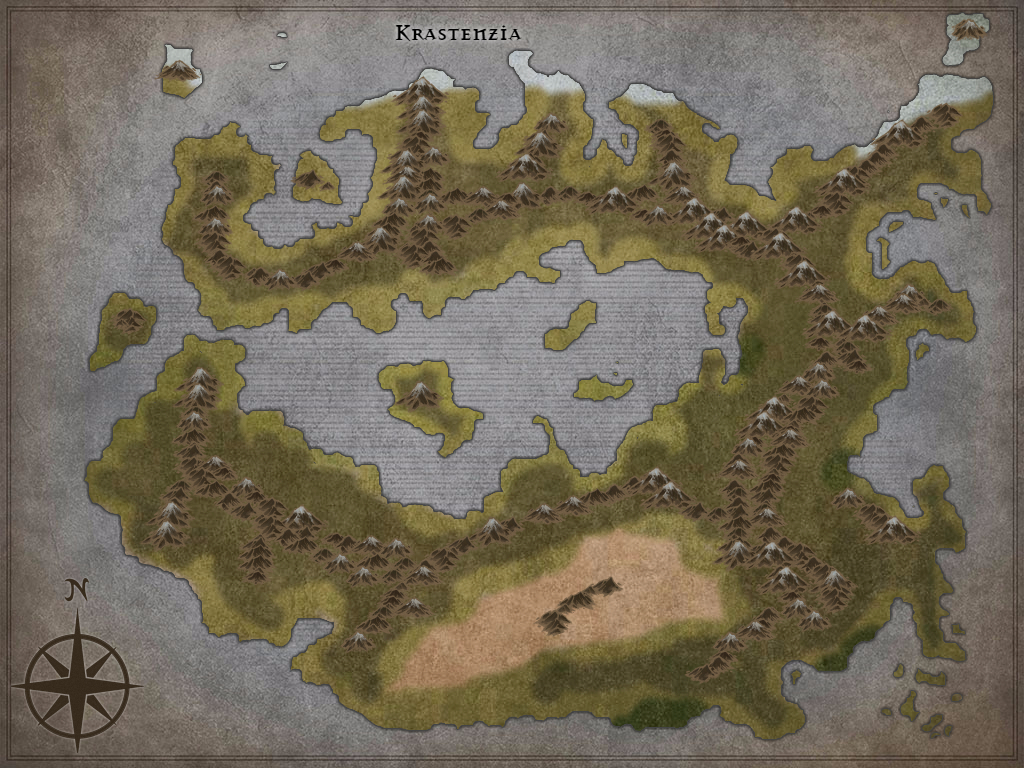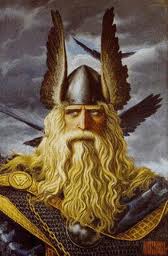Woden, God of Hunting and Winter
Holy Symbol:
Alignment: NG
Domain(s): Hunting, Winter
Favored Weapon: Spear
Favored Class: Druid
Background Story:
Medieval and Early Modern folklore Woden persisted as a figure in folklore and folk religion throughout the Middle Ages and into the modern period, notably as the leader of the Wild Hunt found in English, German, Swiss, and Scandinavian traditions.
Woden is thought to be the precursor of the English Father Christmas, or Father Winter, and the American Santa Claus.
A celebrated late attestation of invocation of Wodan in Germany dates to 1593, in Mecklenburg, where the formula Wode, Hale dynem Rosse nun Voder “Wodan, fetch now food for your horse” was spoken over the last sheaf of the harvest. David Franck adds, that at the squires’ mansions, when the rye is all cut, there is Wodel-beer served out to the mowers; no one weeds flax on a Wodenstag, lest Woden’s horse should trample the seeds; from Christmas to Twelfth-day they will not spin, nor leave any flax on the distaff, and to the question why? they answer, Wode is galloping across. We are expressly told, this wild hunter Wode rides a white horse.
A custom in Schaumburg is reported by Jacob Grimm: the people go out to mow in parties of twelve, sixteen or twenty scythes, but it is managed in such a manner, that on the last day of harvest they are all finished at the same time, or some leave a strip standing which they can cut down at a stroke the last thing, or they merely pass their scythes over the stubble, pretending there is still some left to mow. At the last stroke of the scythe they raise their implements aloft, plant them upright, and beat the blades three times with the strop. Each spills on the field a little of the drink he has, whether beer, brandy, or milk, then drinks himself, while they wave their hats, beat their scythes three times, and cry aloud Wôld, Wôld, Wôld! and the women knock all the crumbs out of their baskets on the stubble. They march home shouting and singing. If the ceremony was omitted, the following year would bring bad crops of hay and corn. The first verse of the song is quoted by Grimm,
„Wôld, Wôld, Wôld! Hävens wei wat schüt, jümm hei dal van Häven süt. Vulle Kruken un Sangen hät hei, upen Holte wässt manigerlei: hei is nig barn un wert nig old. Wôld, Wôld, Wôld! “
“Wôld, Wôld, Wôld”! Heaven’s giant knows what happens, Looking down from heaven, Providing full jugs and sheaves. Many a plant grows in the woods. He is not born and grows not old. “Wôld, Wôld, Wôld”!
Grimm notes that the custom had died out in the fifty years preceding his time of writing (1835).
In England there are also folkloric references to Woden, including the “giants’ dance” of Woden and Frigg in Dent as recorded by Grimm, and the Lincolnshire charm that contained the line “One for God, one for Wod and one for Lok”. Other references include the Northumbrian Auld Carl Hood from the ballad Earl Brand Herla, Woden’s role as the leader of the Wild Hunt in Northern England and in all likelihood Herne, the Wild Huntsman of Berkshire.
Achievements: Woden while on a hunt slew the giant boar Black Tusk that belonged to the God of Death inciting his rage and anger.
Worhipping: Priests of this god perform their duties by managing the beasts of the forest. Priests ensure springs and kept clean for the animals of the forest. Clear any taint from forests. There are 3 groves dedicated to Woden. They are Bleckenstein grove, Bavarian grove, and Schleinzenberg grove. Woden expects his followers to keep his forests clean, clear of taint, of full of wild life. He has 3 Precepts: 1. Thou shall only hunt for ceremonies or to clear taint. 2. Thou shall keep the forests clean and prestine. 3. Thou shall guard the forests and help them prosper.
Omens and Signs: Woden expresses guides the mortals usually through these signs and omens: Omens: 1. Black Raven cawwing at the wind. 2. Purple mushrooms at the south side of trees grow. 3. A lone pine needle-less pinetree.
Signs: 1. A pure black rabbit. 2. A pure black owl. 3. A white Unicorn.
Artifacts: Spear of Woden
Staff of Woden – supposedly lost in the Bavarian Forest.
Holy Text of Woden – housed in a tree within the Schleizenberg grove.
Ceremonies/Holidays:
Wodensday:On this day a hunt is called upon to hunt down the biggest boar within the forests.
Clausday:On this day presents are shared much like Christmas today.
Harvestday:Thanksgiving for Woden followers.
Sects:
Protectors of the Forest:
Alignment: NG
Governing Precept: Protect the wildlife of the forest.
Heirarchy: The Protectors of the Forest are governed by 3 paladins.
Albrecht von Schleitz
Leopold von Grungenheim
Siegfried von Beidelstein
Rites and Ceremonies: Paladins conduct monthly ceremonies in which they secure the forests and take stock of the wildlife.
Druids of Bavarian Forest:
Alignment: NG
Governing Precept: Keep the forests pristine.
Heirarchy: The druids are ruled by a council of 5 Druids.
Klara Gudwald
Volkard Meisheim
Elsa Vickreim
Heinrich Beschwaltz
Viktoria Greibelheitz
Rites and Ceremonies: Druids are called upon once per month to attend to the cleaning of the forest.
Aphorisms and Words of Wisdom: May the forest guide you. May you always smell of pine needles.
Noteable minions or NPCs: Sleipnir – Woden’s horse that is pure white and is often spotted roaming the wilds of the Bavarian Forest.
Domain(s): Hunting, Winter
Favored Weapon: Spear
Favored Class: Druid
Background Story:
Medieval and Early Modern folklore Woden persisted as a figure in folklore and folk religion throughout the Middle Ages and into the modern period, notably as the leader of the Wild Hunt found in English, German, Swiss, and Scandinavian traditions.
Woden is thought to be the precursor of the English Father Christmas, or Father Winter, and the American Santa Claus.
A celebrated late attestation of invocation of Wodan in Germany dates to 1593, in Mecklenburg, where the formula Wode, Hale dynem Rosse nun Voder “Wodan, fetch now food for your horse” was spoken over the last sheaf of the harvest. David Franck adds, that at the squires’ mansions, when the rye is all cut, there is Wodel-beer served out to the mowers; no one weeds flax on a Wodenstag, lest Woden’s horse should trample the seeds; from Christmas to Twelfth-day they will not spin, nor leave any flax on the distaff, and to the question why? they answer, Wode is galloping across. We are expressly told, this wild hunter Wode rides a white horse.
A custom in Schaumburg is reported by Jacob Grimm: the people go out to mow in parties of twelve, sixteen or twenty scythes, but it is managed in such a manner, that on the last day of harvest they are all finished at the same time, or some leave a strip standing which they can cut down at a stroke the last thing, or they merely pass their scythes over the stubble, pretending there is still some left to mow. At the last stroke of the scythe they raise their implements aloft, plant them upright, and beat the blades three times with the strop. Each spills on the field a little of the drink he has, whether beer, brandy, or milk, then drinks himself, while they wave their hats, beat their scythes three times, and cry aloud Wôld, Wôld, Wôld! and the women knock all the crumbs out of their baskets on the stubble. They march home shouting and singing. If the ceremony was omitted, the following year would bring bad crops of hay and corn. The first verse of the song is quoted by Grimm,
„Wôld, Wôld, Wôld! Hävens wei wat schüt, jümm hei dal van Häven süt. Vulle Kruken un Sangen hät hei, upen Holte wässt manigerlei: hei is nig barn un wert nig old. Wôld, Wôld, Wôld! “
“Wôld, Wôld, Wôld”! Heaven’s giant knows what happens, Looking down from heaven, Providing full jugs and sheaves. Many a plant grows in the woods. He is not born and grows not old. “Wôld, Wôld, Wôld”!
Grimm notes that the custom had died out in the fifty years preceding his time of writing (1835).
In England there are also folkloric references to Woden, including the “giants’ dance” of Woden and Frigg in Dent as recorded by Grimm, and the Lincolnshire charm that contained the line “One for God, one for Wod and one for Lok”. Other references include the Northumbrian Auld Carl Hood from the ballad Earl Brand Herla, Woden’s role as the leader of the Wild Hunt in Northern England and in all likelihood Herne, the Wild Huntsman of Berkshire.
Achievements: Woden while on a hunt slew the giant boar Black Tusk that belonged to the God of Death inciting his rage and anger.
Worhipping: Priests of this god perform their duties by managing the beasts of the forest. Priests ensure springs and kept clean for the animals of the forest. Clear any taint from forests. There are 3 groves dedicated to Woden. They are Bleckenstein grove, Bavarian grove, and Schleinzenberg grove. Woden expects his followers to keep his forests clean, clear of taint, of full of wild life. He has 3 Precepts: 1. Thou shall only hunt for ceremonies or to clear taint. 2. Thou shall keep the forests clean and prestine. 3. Thou shall guard the forests and help them prosper.
Omens and Signs: Woden expresses guides the mortals usually through these signs and omens: Omens: 1. Black Raven cawwing at the wind. 2. Purple mushrooms at the south side of trees grow. 3. A lone pine needle-less pinetree.
Signs: 1. A pure black rabbit. 2. A pure black owl. 3. A white Unicorn.
Artifacts: Spear of Woden
Staff of Woden – supposedly lost in the Bavarian Forest.
Holy Text of Woden – housed in a tree within the Schleizenberg grove.
Ceremonies/Holidays:
Wodensday:On this day a hunt is called upon to hunt down the biggest boar within the forests.
Clausday:On this day presents are shared much like Christmas today.
Harvestday:Thanksgiving for Woden followers.
Sects:
Protectors of the Forest:
Alignment: NG
Governing Precept: Protect the wildlife of the forest.
Heirarchy: The Protectors of the Forest are governed by 3 paladins.
Albrecht von Schleitz
Leopold von Grungenheim
Siegfried von Beidelstein
Rites and Ceremonies: Paladins conduct monthly ceremonies in which they secure the forests and take stock of the wildlife.
Druids of Bavarian Forest:
Alignment: NG
Governing Precept: Keep the forests pristine.
Heirarchy: The druids are ruled by a council of 5 Druids.
Klara Gudwald
Volkard Meisheim
Elsa Vickreim
Heinrich Beschwaltz
Viktoria Greibelheitz
Rites and Ceremonies: Druids are called upon once per month to attend to the cleaning of the forest.
Aphorisms and Words of Wisdom: May the forest guide you. May you always smell of pine needles.
Noteable minions or NPCs: Sleipnir – Woden’s horse that is pure white and is often spotted roaming the wilds of the Bavarian Forest.
Type
Religious, Pantheon





Comments